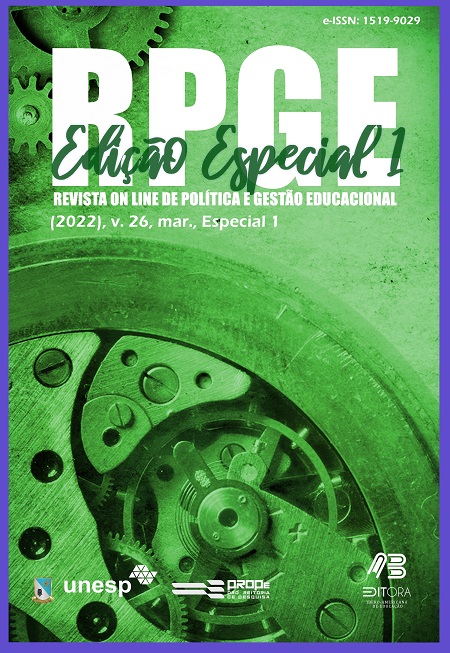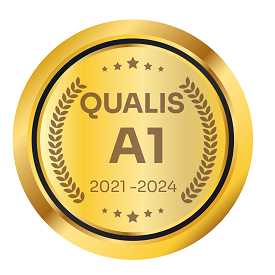Sociedad de la información
Aproximación psicológica a los sitios de redes sociales (un estudio educativo)
DOI:
https://doi.org/10.22633/rpge.v26iesp.1.16511Palabras clave:
Sociedad de la información, FOMO, Sitios de redes sociales (SNSS), Trastorno por déficit de atención e hiperactividad TDA/H), Salud mentalResumen
El trabajo examina el enfoque psicológico de los sitios de redes sociales (SNS) y su impacto en las personas. No se puede afirmar categóricamente que las redes sociales solo traen beneficio o solo daño. Existen tanto redes sociales con un enfoque estrecho, que pueden ser útiles para fines laborales, como redes sociales multiusuario, con una gran funcionalidad que asegura tanto el cumplimiento de los objetivos comerciales como el entretenimiento. Pueden ayudar a pasar el tiempo, pero también pueden inducir con éxito la adicción en personas con exceso de ese mismo tiempo. En consecuencia, la influencia de las redes sociales en la sociedad es muy diversa y ambigua, y el impacto sobre un individuo en particular depende de sus cualidades subjetivas. Dado que las redes sociales son un fenómeno relativamente reciente, esta posible relación entre su uso y los sentimientos de soledad y depresión aún no se ha investigado adecuadamente. El miedo a perderse algo (FOMO) es otro efecto de salud mental que se ha relacionado fuertemente con el uso de las redes sociales.
Descargas
Citas
ANSARI, J. A. N.; KHAN, N. A. Exploring the role of social media in collaborative learning the new domain of learning Smart Learn. Environ, v. 7, p. 9-17, 2020. DOI: 10.1186/s40561-020-00118-7.
AZIZI, S. M.; SOROUSH, A.; KHATONY, A. The relationship between social networking addiction and academic performance in Iranian students of medical sciences: a cross-sectional study. BMC Psychol., v. 7, n. 1, p. 1-8, 2019.
BEKALU, M. A.; MCCLOUD, R. F.; VISWANATH K. Association of social media use with social well-being, positive mental health, and self-rated health: disentangling routine use from emotional connection to use. Health Educ. Behav., v. 46, suppl. 2, p. 69-80, 2019.
BOUYGUES, H. L. Social Media Is a Public Health Crisis. Let’s Treat It Like One. U.S. News, 2021. Available: https://www.usnews.com/news/health-news/articles/2021-07-20/social-media-is-a-public-health-crisis. Access: 10 Out. 2021.
COPPES, M. J. Teens and Social Media: When is it too much? University of Nevada. Scool of Medicine, 2019. Available: https://med.unr.edu/news/archive/2019/coppes-teens-and-social-media. Access: 10 Jan. 2021.
DANIELS, N. How Does Social Media Affect Your Mental Health? The New York Times, 2021. Available: https://www.nytimes.com/2021/10/01/learning/how-does-social-media-affect-your-mental-health.html. Access: 10 Jan. 2021.
EDMONDS, R. Anxiety, loneliness and fear of missing out: The impact of social media on young people’s mental health. 2021. Available: https://www.centreformentalhealth.org.uk/blogs/anxiety-loneliness-and-fear-missing-out-impact-social-media-young-peoples-mental-health. Access: 10 Jan. 2021.
HOLTERMANN, C. Should There Be Separate Social Media Apps for Children? The New York Times, 2021. Available: https://www.nytimes.com/2021/04/19/learning/should-there-be-separate-social-media-apps-for-children.html. Access: 10 Out. 2021.
KOLHAR, M.; AHMEDKAZI R. N.; ALAMEEN A. Effect of social media use on learning, social interactions, and sleep duration among university students. Saudi Journal of Biological Sciences, v. 28, n. 4, p. 2216-2222, 2021.
MORIN, A. What Your Facebook Use Reveals About Your Personality And Your Self-Esteem. Forbes, 2014. Available: https://www.forbes.com/sites/amymorin/2014/10/31/what-your-facebook-use-reveals-about-your-personality-and-your-self-esteem/?sh=64f04fbc321f. Access: 10 Jan. 2021.
NITTLE, N. How Does Social Media Play a Role in Depression. Very Well Mind, 2021. Available: https://www.verywellmind.com/social-media-and-depression-5085354. Access: 10 Out. 2021.
NORTON, A. Too Much Social Media Time Could Raise Risk of Depression. Web MD, Health Day, 2020. Available: https://www.webmd.com/depression/news/20201214/too-much-social-media-time-could-raise-risk-of-depression. Access: 10 Out. 2021.
POPLAVSKIY, M. M. Azbuka pablik ryleyshnz: navch. posib. dlya stud. vyshch. navch. zakl. [Alphabet of public relations: textbook for students of higher educational establishments] Kyiv: Delta, 117, 2007.
POPLAVSKIY, M. M. Sotsialni merezhi yak kulturno-prosvitnytskyi resurs [Social Networks as a Cultural and Educational Resource]. Ukrainian Information Space, 73, 2020.
RYBINSKA, Y., LOSHENKO, O., KURAPOV, A., PONOCHOVNA-RYSAK, T., & KHOLMAKOVA, Y. The change in the concept of virtue during the COVID-19 pandemic. Amazonia Investiga, v. 10, n. 47, p. 62-69, 2021. Available: 10.34069/AI/2021.47.11.7
RYBINSKA, YU. A. Lingvo-Sociocultural Specific of Talk Show Translation as a TV Discourse Genre. Psycholinguistics, Pereyaslav-Khmelnytsky State Pedagogical University named after Hryhoriy Skovoroda, v. 23, n. 2, p. 192-202, 2018.
RYBINSKA, YU. A. Methodical foundations of the professional communicative preparation of future philologists by means of creative writing. Bulletin of Zhytomyr State University named after Ivan Franko, v. 92, n. 1, p. 5-9, 2018.
SINGKH, A. Positive and negative effect of social media on education. 2020. Available: https://www.theasianschool.net/blog/positive-negative-effect-of-social-media-on-education. Access: 10 Jan. 2021.
Publicado
Cómo citar
Número
Sección
Licencia
Derechos de autor 2022 Revista on line de Política e Gestão Educacional

Esta obra está bajo una licencia internacional Creative Commons Atribución-NoComercial-CompartirIgual 4.0.
Manuscritos aceitos e publicados são de propriedade da Revista on line de Política e Gestão Educacional. É vedada a submissão integral ou parcial do manuscrito a qualquer outro periódico. A responsabilidade do conteúdo dos artigos é exclusiva dos autores. É vedada a tradução para outro idioma sem a autorização escrita do Editor ouvida a Comissão Editorial Científica.











